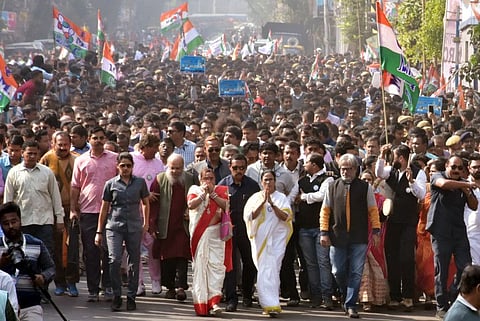Intolerance across India's political spectrum
Some leaders are disdainful when it comes to political issues closer home

India has a recency problem. What happens today wipes the memory of yesterday. The day before is already so much in the past, it may not have happened at all.
These tricks of memory have a significant political value. One reason why India’s civil society comes across unreasonably unstable and jejune is that their discourse is largely determined by recency. As a result, Narendra Modi or Amit Shah appears to be the only villains in an ongoing play in which, if you train the spotlights, every second person appears equally guilty of high-handedness.
Consider, for instance, the Kerala chief minister and Marxist party leader, Pinarayi Vijayan. Kerala is the only red spot in India. All of mainstream Indian Marxism hangs by the Kerala thread. As life indices in Kerala are traditionally high — no matter which party, the Communists or the Congress, forms the government — the state offers a kind of model of development to the rest of India. It is a false model to the extent that Kerala is still largely run on the remittance from Gulf expatriates, or Malayalis working in other Indian cities.
Nevertheless, there is a halo about the state and its people. And Vijayan and his party claim credit for great governance. So be it. But tolerance of dissent, so integral to a functioning democracy, is not his, or his party’s, strength. Only in October, a police operation in the tribal district of Attapady in Palakkad involved an encounter that killed four Maoists. Vijayan dismissed it as the police firing in self protection. The bullets though seemed to have entered the backs of the victims, according to reports.
Indian democracy is finding itself constantly arriving back at the same point of departure. It is, in one word, stuck in the groove of today. The past is missing from the picture when it comes to a tempered judgement. Which is why tomorrow is all set to look bewilderingly like todayC.P. Surendran
Right after this incident, two youngsters, Alan Suhaib and Thaha Fazal were arrested for alleged Maoist links and put away in jail. To believe in Mao is not a crime in India. Indeed in Chhattisgarh, the government in power at the time sponsored an anti-Maoist, popular movement called the Salwa Judum to fight a virulent brand of Maoist militancy. On 5 July 2011, the Supreme Court of India declared the Salwa Judum as illegal and unconstitutional.
The encounter killings of the Attapady Maoists and the subsequent arrests of the two young men are not legal. But it is not even the legality of the issue that is in question, really. It is the disproportionate nature of the reaction by those in power to dissent. Vijayan’s image as a man taking on the might of Modi or Shah — the two men who are by the Indian liberal’s standards dismantling democratic India — is at clear dissonance with the reality.
The other great rebel is Mamata Banerjee, West Bengal chief minister. She exploits to the full her hysteria of temperament, and the relative protection afforded by her gender in these woke times to the point that even Amit Shah has to be cautionary in his approach.
But neither her temperament nor her gender explains so much her Teflon-like image as the recency problem of the public. Banerjee’s impatience with dissidence is not new. Though she is off-again and on-again friends with the Congress Party, when Dr. Manmohan Singh was in power (in 2012), a rights activist Aruna Roy, wrote to Dr. Singh about Banerjee: “An internationally reputed scientist, Professor Partho Sarothi Ray, and faculty member of the Indian Institute of Science Education and Research (IISER), Kolkata, was arrested with several others at a peaceful and legitimate protest against the eviction of slum dwellers in Nonadanga, Kolkata. He and six others are being held on false charges of inciting violence and conspiring against the State, and are even being denied bail.” Roy continued: “With every hearing, additional charges are being pressed against him…”.
Also Read: Citizenship Act breaks the promise of India
Well, down the long days, nothing has changed. Earlier this year Banerjee had a local BJP activist arrested for putting out on the social media a meme in which the actor Priyanka Chopra’s rather weird hairstyle at the New York Met Gala found a new and unlikely head above Banerjee’s neck. There have been several other instances of Banerjee’s low threshold for criticism.
Equally, there are other political leaders from the opposite end of the spectrum who fight ferociously for the cause of democracy, but are tyrannical when it comes to issues closer home. This follows the general trend of social media, too, where the liberals, championing democracy and dissent, quickly forget their own intolerance — as evidenced in their language and comments — of anti-thetical views. The epidemic of amnesia spares few, and forges the false idea that villainy in India is headed by a team of two: Modi and Shah. The rest comes across as nothing short of angels.
This perception is dangerous. If only because the Indian voter for any reasonably long period is unable to store information that goes against the trend of the day. Vijayan, Banerjee, or some other deity is attributed heroism that is not in keeping with the facts. The cumulative effect of the recency problem is a naive narrative that those in power at the Centre are villains by default; those who oppose them, saints. This is why Indian democracy is finding itself constantly arriving back at the same point of departure. It is, in one word, stuck in the groove of today. The past is missing from the picture when it comes to a tempered judgement. Which is why tomorrow is all set to look bewilderingly like today.
— C.P. Surendran is a senior journalist based in India



